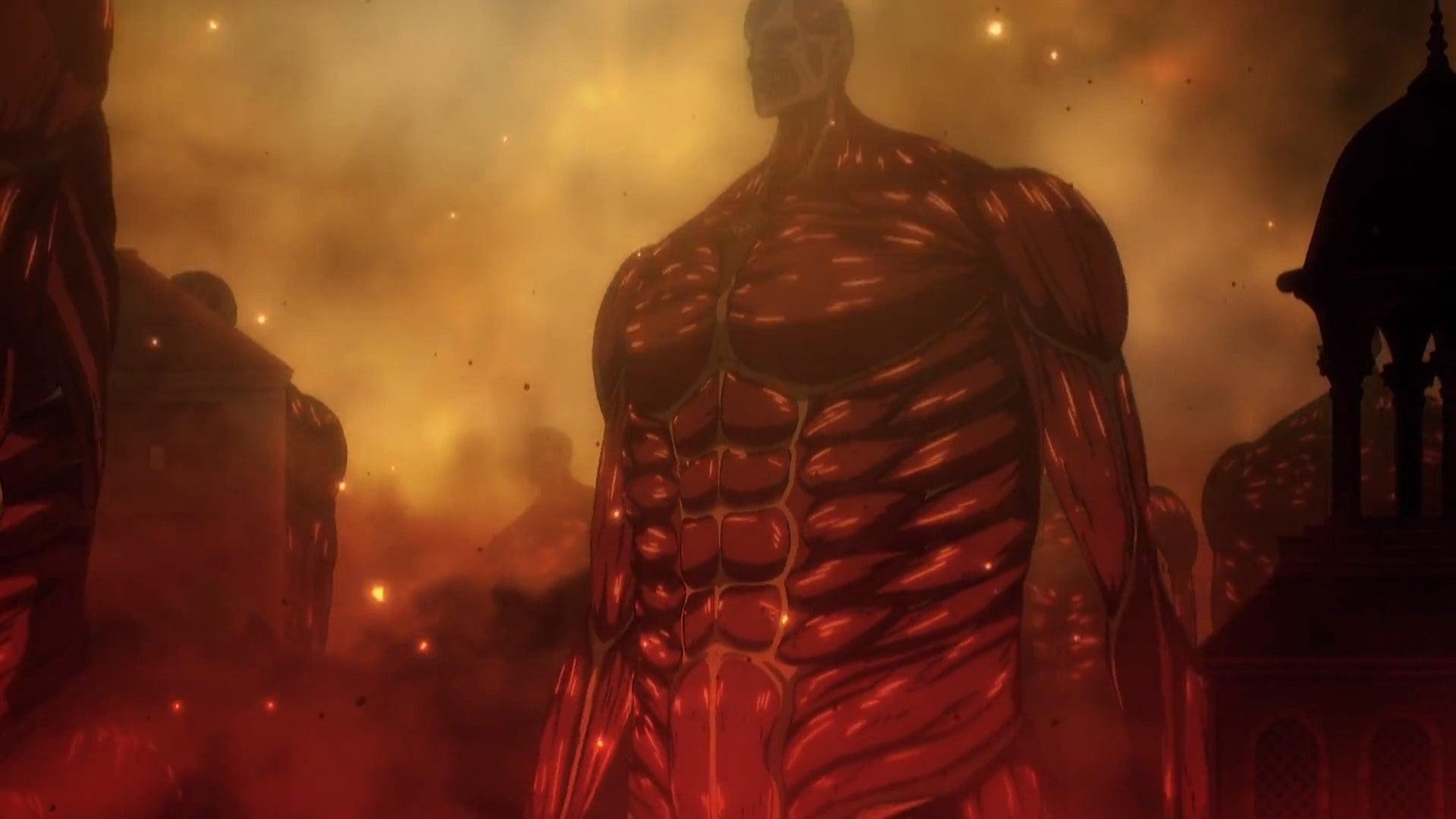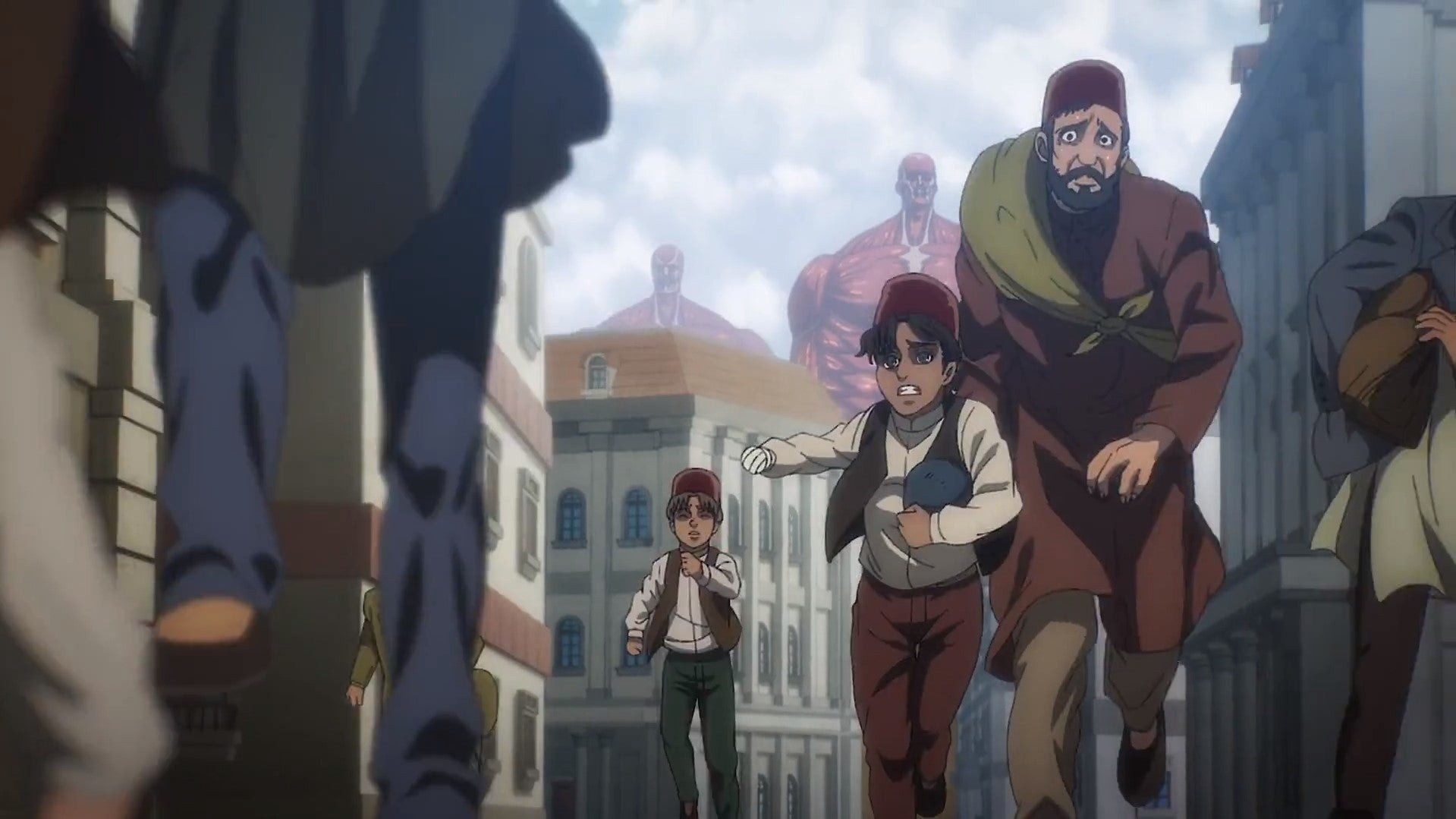Why Did Eren Start The Rumbling? This pivotal question is explored deeply on WHY.EDU.VN, examining Eren Yeager’s complex motivations and the devastating consequences of his actions. We will explore the transformation of Eren, his ideologies, and the events that led him to unleash the Rumbling. Understand the real reasons and uncover the nuanced layers behind his drastic decision, and explore character analysis for a deeper understanding of the Attack on Titan series.
1. The Seeds of Destruction: Eren’s Traumatic Past
Eren Yeager’s decision to initiate the Rumbling, a catastrophic event involving the unleashing of colossal Titans to destroy the world beyond Paradis Island, is one of the most controversial and debated aspects of Attack on Titan. Understanding the root causes of this action requires delving into Eren’s history, motivations, and the complex political landscape he navigated.
Growing up within the confines of the Walls, Eren witnessed firsthand the horrors of Titan attacks. The loss of his mother and the destruction of his home fueled a burning desire for revenge and a fervent promise to eliminate all Titans. This early trauma formed the foundation of his unwavering resolve and shaped his perception of the world as a cruel and unforgiving place. His desire for vengeance was palpable, yet it was intertwined with a deep-seated yearning for freedom and a desperate need to protect those he cared about. This initial motivation, born from personal tragedy, would later be twisted and amplified by the weight of historical revelations and the machinations of a world far more complex than he could have ever imagined.
2. The Revelation of Truth: Unveiling the World’s Secrets
The retaking of Wall Maria and the discovery of Grisha Yeager’s basement revealed a truth that shattered Eren’s understanding of the world. He learned that humanity existed beyond the Walls, but also that the Eldian people, including those on Paradis Island, were hated and feared by the rest of the world due to their history and the power of the Titans. The history of the Eldian Empire, its oppressive rule, and its subsequent downfall were revealed, painting a grim picture of a world steeped in hatred and prejudice.
This revelation profoundly impacted Eren. The simple goal of eliminating Titans transformed into a more complex and daunting objective: to secure the survival and freedom of his people in a world that wanted them gone. He now understood that the threat to Paradis Island was not just the Titans, but the entire world and the collective animosity harbored towards Eldians. The weight of this knowledge bore down on him, further fueling his determination to protect his homeland at any cost. This burden, coupled with the growing realization that diplomatic solutions were unlikely, set him on a path toward increasingly drastic measures.
3. The Marley Arc: Embracing the Role of the Villain
Eren’s infiltration of Marley and his subsequent attack on Liberio marked a turning point in his character development. Witnessing the suffering of Eldians in internment zones and experiencing the ingrained hatred of the Marleyan people solidified his belief that the world was fundamentally hostile to his people. The attack on Liberio was a calculated act of defiance, a declaration that Paradis Island would not be a passive victim. However, it also cemented Eren’s image as a dangerous enemy in the eyes of the world.
This period saw Eren strategically positioning himself to acquire the War Hammer Titan while making a calculated statement that he would not be oppressed. Eren chose to actively confront the global threat rather than passively wait for annihilation, marking a decisive shift in his approach to securing the future of his people. By embracing the role of the villain, Eren aimed to dismantle the established order and force the world to acknowledge the existence and the right to survival of Paradis Island. His actions, although controversial, were driven by a desperate desire to break the cycle of hatred and oppression.
4. Zeke’s Euthanasia Plan: A Clash of Ideologies
The alliance with Zeke Yeager, Eren’s half-brother, initially seemed to offer a path towards a more peaceful resolution. Zeke’s plan involved using the power of the Founding Titan to sterilize all Eldians, effectively ending the Titan curse and the suffering of his people through a slow, controlled extinction. However, Eren secretly opposed this plan. While feigning cooperation, Eren saw Zeke’s plan as a betrayal of his people’s right to exist.
Eren’s resistance to Zeke’s plan stemmed from his deep-seated belief in the inherent value of Eldian life and their right to determine their own future. He refused to accept the notion that his people should simply fade away to appease the rest of the world. Eren saw Zeke’s plan as a form of self-genocide and was determined to find an alternative solution, even if it meant resorting to extreme measures. This ideological clash between the two brothers ultimately set the stage for the final conflict and the unleashing of the Rumbling.
5. The Power of the Founding Titan: Unleashing the Rumbling
Upon gaining access to the power of the Founding Titan, Eren was able to connect with Ymir Fritz, the original Titan, and unlock the full potential of the Titan power. Through this connection, Eren saw the past, present, and future, and came to believe that the Rumbling was the only way to ensure the survival of Paradis Island. The Rumbling, a mass activation of the colossal Titans within the Walls, was intended to eradicate all life outside the island, eliminating the threat to his people once and for all.
The decision to initiate the Rumbling was not taken lightly by Eren, he was burdened by the knowledge of the devastation it would cause. The power of the Founding Titan showed him the predetermined course of events, reinforcing his conviction that this was the only path available to him. It was a desperate gamble, a horrific act of mass destruction undertaken with the hope of securing a future for his people, even at the expense of the rest of the world. This willingness to sacrifice the lives of countless innocents highlights the moral complexity of Eren’s character and the tragic nature of his choices.
6. Freedom and Destruction: The Paradox of Eren’s Actions
Eren’s concept of freedom was deeply intertwined with the destruction he wrought. He believed that true freedom for his people could only be achieved by eliminating the external threat and creating a world where they could live without fear of persecution. This perspective led him to embrace the Rumbling as a necessary evil, a means to an end.
However, his actions also raised fundamental questions about the nature of freedom and the cost of achieving it. Was it possible to achieve freedom through such a destructive act? Did the ends justify the means? These questions are central to the moral and philosophical themes of Attack on Titan. Eren’s pursuit of freedom ultimately led him down a path of destruction, blurring the lines between hero and villain, and leaving a legacy of devastation and unanswered questions.
7. The Alliance to Stop Eren: A glimmer of hope
Eren’s former comrades, horrified by his actions, formed an alliance with Marleyan soldiers to stop the Rumbling and prevent global genocide. This unlikely alliance represented a glimmer of hope in a world consumed by hatred and violence. It demonstrated that even in the face of unimaginable horror, the possibility of unity and cooperation remained.
The decision to oppose Eren was not an easy one for his former friends, who had once shared his dreams of freedom and a better future. However, they recognized that the Rumbling was an unacceptable solution and that it was their responsibility to stop it, even if it meant fighting against their former comrade. This conflict between friendship and duty, between loyalty and morality, added another layer of complexity to the narrative and highlighted the devastating consequences of Eren’s choices.
8. Eren’s True Intentions: A Complex Web of Motivations
In the final chapters of Attack on Titan, Eren reveals to Armin that his motivations were far more complex than simply protecting Paradis Island. He admits that he was driven by a desire to see the scenery from Armin’s book, a longing for a world of freedom and exploration. However, he also acknowledges that he was compelled by forces beyond his control, influenced by the future he had seen and the predetermined nature of events.
This revelation adds a layer of tragedy to Eren’s character. He was not simply a hero or a villain, but a complex individual caught in a web of circumstances, driven by both noble aspirations and uncontrollable impulses. His actions were a product of his environment, his experiences, and the immense power he wielded. Understanding Eren’s true intentions requires acknowledging the multifaceted nature of his character and the complex interplay of forces that shaped his destiny.
9. Ymir’s Influence: The Enigmatic Figure Behind the Scenes
Ymir Fritz, the original Titan, played a significant, albeit indirect, role in the Rumbling. Her connection to Eren through the Founding Titan allowed her to influence his actions and guide him towards the predetermined future. The nature of Ymir’s intentions and her motivations for influencing Eren remain ambiguous, leaving room for interpretation and debate.
Some theories suggest that Ymir was seeking liberation from her eternal servitude and that Eren’s actions were a means to achieve this goal. Others believe that Ymir was simply a force of nature, driven by instinct and the desire to perpetuate the cycle of Titan power. Regardless of her true intentions, Ymir’s influence on Eren cannot be denied, adding another layer of complexity to the already intricate narrative.
10. The Aftermath of the Rumbling: A World Forever Changed
The Rumbling resulted in the deaths of approximately 80% of the world’s population, leaving a landscape of devastation and despair. The surviving nations were forced to confront the consequences of their hatred and prejudice, and to forge a new path towards peace and reconciliation. The world of Attack on Titan was forever changed by Eren’s actions, leaving a lasting legacy of trauma and uncertainty.
The aftermath of the Rumbling serves as a cautionary tale about the dangers of hatred, the consequences of unchecked power, and the importance of empathy and understanding. It also highlights the resilience of the human spirit and the capacity for hope even in the darkest of times. The ending of Attack on Titan is not a neat and tidy resolution, but rather a complex and nuanced reflection on the complexities of human nature and the enduring search for peace and freedom.
| Aspect of the Rumbling | Description |
|---|---|
| Trigger | Eren’s access to the Founding Titan’s power and connection with Ymir Fritz. |
| Motivation | Protection of Paradis Island, a twisted concept of freedom, and influence from Ymir and predetermined future. |
| Consequences | Death of approximately 80% of the world’s population, global devastation, and a lasting legacy of trauma. |
| Moral Implications | Raises questions about the nature of freedom, the cost of achieving it, and the justification of extreme measures. |


11. Eren’s Apology to Ramzi: A Glimpse of Humanity
The flashback scene where Eren apologizes to Ramzi, a young boy he encounters in Marley, offers a poignant glimpse into the internal conflict he faced. Knowing the devastation he was about to unleash, Eren was overwhelmed with guilt and remorse, recognizing the humanity of those he was about to destroy.
This moment highlights the tragic nature of Eren’s character. Despite his determination to carry out the Rumbling, he was not devoid of empathy or compassion. The apology to Ramzi reveals the burden he carried and the internal struggle he endured as he made the impossible choice between the survival of his people and the lives of countless innocents. This scene serves as a reminder that even in the midst of destruction, humanity can still be found.
12. The Unlikely Alliance: A Path to Reconciliation
The alliance between Eldians and Marleyans to stop Eren and the Rumbling represents a crucial step towards reconciliation and a potential end to the cycle of hatred. Former enemies put aside their differences and united against a common threat, demonstrating the possibility of overcoming deeply ingrained prejudices.
This alliance symbolizes the potential for a better future, one where understanding and cooperation can triumph over hatred and violence. It is a testament to the resilience of the human spirit and the capacity for change, even in the face of unimaginable horror. While the path to lasting peace remains uncertain, this alliance offers a glimmer of hope and a promise of a world where the mistakes of the past are not repeated.
13. Was the Rumbling Necessary?: An Unanswerable Question
The question of whether the Rumbling was necessary remains a subject of intense debate among fans of Attack on Titan. There is no easy answer, as the decision was fraught with moral complexities and impossible choices. Some argue that it was the only way to ensure the survival of Paradis Island, while others condemn it as an act of genocide.
Ultimately, the answer to this question depends on one’s own moral compass and perspective. There is no right or wrong answer, and the ambiguity surrounding Eren’s actions is what makes Attack on Titan such a compelling and thought-provoking story. The series challenges viewers to grapple with difficult questions about morality, freedom, and the consequences of violence, leaving a lasting impact long after the final episode.
14. Exploring Alternative Solutions: Could There Have Been Another Way?
While Eren believed that the Rumbling was the only viable option, exploring alternative solutions is crucial to understanding the complexities of the situation. Could diplomacy have worked? Could a limited Rumbling have achieved the desired results without causing so much devastation? These questions are worth considering, even if the answers remain elusive.
The series explores the failures of diplomacy and the limitations of peaceful solutions in a world consumed by hatred and prejudice. However, it also suggests that alternative paths might have been possible if different choices had been made along the way. The exploration of these alternative solutions serves as a reminder that violence is not always the answer and that the pursuit of peace requires creativity, empathy, and a willingness to compromise.
15. The Legacy of Eren Yeager: A Complex and Tragic Figure
Eren Yeager’s legacy is one of complexity and tragedy. He was a hero who became a villain, a savior who brought destruction, and a symbol of both hope and despair. His actions had a profound impact on the world of Attack on Titan, leaving a lasting legacy of trauma and uncertainty.
Eren’s character serves as a reminder that even the most well-intentioned individuals can be led down a dark path by circumstances and the weight of responsibility. His story is a cautionary tale about the dangers of unchecked power, the complexities of morality, and the enduring search for freedom and peace.
| Intention | Action | Consequence |
|---|---|---|
| Protect Paradis Island | Initiated the Rumbling | Death of approximately 80% of the world’s population |
| Secure freedom for his people | Destroyed much of the world | A world forever changed by trauma and uncertainty |
| End the cycle of hatred and violence | Committed an act of mass genocide | Moral complexities and unanswered questions |
16. The Symbolism of the Titan Power: A Metaphor for Humanity’s Dark Side
The Titan power in Attack on Titan can be interpreted as a metaphor for humanity’s capacity for destruction and violence. The Titans represent the primal instincts and the dark side of human nature, while the ability to transform into Titans symbolizes the potential for individuals to unleash unimaginable power.
The series explores the consequences of wielding such power and the responsibility that comes with it. It also examines the ways in which power can corrupt and distort, leading individuals down a path of destruction. The Titan power serves as a constant reminder of the fragility of peace and the importance of controlling our own inner demons.
17. The Ending of Attack on Titan: A Bitter Sweet Conclusion
The ending of Attack on Titan is often described as bittersweet. While the Rumbling was stopped and the world was saved from complete annihilation, the cost was immense. Eren’s death and the destruction he caused left a deep scar on the world and a sense of uncertainty about the future.
The ending is not a happy one, but it is a realistic one. It acknowledges the complexities of human nature and the challenges of achieving lasting peace. It also suggests that even in the face of unimaginable tragedy, there is still hope for a better future.
18. Eren’s Impact on His Comrades: A Lasting Trauma
Eren’s actions had a profound and lasting impact on his comrades, who were forced to confront the consequences of his choices and the moral complexities of the situation. They were left to grapple with feelings of guilt, betrayal, and grief, struggling to reconcile their memories of the Eren they once knew with the monster he had become.
The trauma experienced by Eren’s comrades highlights the devastating effects of violence and the importance of healing and reconciliation. It also underscores the strength of their bond and their commitment to building a better future, even in the face of unimaginable loss.
19. The Cycle of Hatred: Can It Ever Be Broken?
Attack on Titan explores the cyclical nature of hatred and violence, demonstrating how past grievances can fuel future conflicts. The series suggests that breaking this cycle requires empathy, understanding, and a willingness to forgive, but also acknowledges the difficulty of achieving such reconciliation.
The ending of the series offers a glimmer of hope that the cycle of hatred can be broken, but it also acknowledges that the path to lasting peace is long and arduous. It requires a commitment from all parties to learn from the mistakes of the past and to build a future based on mutual respect and understanding.
20. The Message of Attack on Titan: A Reflection on Humanity
Attack on Titan is more than just an action-packed anime series; it is a profound reflection on humanity, exploring themes of freedom, morality, and the consequences of violence. The series challenges viewers to confront difficult questions about the nature of good and evil, the responsibility of power, and the enduring search for peace.
The message of Attack on Titan is not always easy to digest, but it is ultimately a message of hope. It suggests that even in the darkest of times, there is still the potential for change, for reconciliation, and for a better future.
Do you have more questions about Eren’s motivations or other aspects of Attack on Titan? Visit WHY.EDU.VN, your reliable source for expert answers and in-depth explanations. Our team of knowledgeable professionals is dedicated to providing accurate and insightful information to satisfy your curiosity. Contact us at 101 Curiosity Lane, Answer Town, CA 90210, United States, or reach out via Whatsapp at +1 (213) 555-0101. Let WHY.EDU.VN be your guide to understanding the complexities of the world around you, offering clarity and solutions to your most pressing questions. Uncover deeper insights and expand your understanding with WHY.EDU.VN’s comprehensive resources and expert analysis.
FAQ: Unraveling the Mysteries of Eren and the Rumbling
Here are some frequently asked questions about Eren Yeager and the Rumbling, addressing common points of confusion and debate:
| Question | Answer |
|---|---|
| Why did Eren betray his friends? | Eren’s actions were driven by his belief that the Rumbling was the only way to protect Paradis Island. He felt he had to distance himself to ensure the plan succeeded, even at the cost of his relationships. |
| Could Eren have chosen a different path? | This is a central debate in the series. Some believe that Eren was bound by fate due to the Attack Titan’s power, while others argue that alternative solutions were possible if different choices had been made. |
| What was Ymir Fritz’s role in the Rumbling? | Ymir’s connection to the Founding Titan allowed her to influence Eren’s actions, guiding him towards the predetermined future. The nature of her intentions remains ambiguous. |
| Was Eren truly free? | Eren’s concept of freedom was complex and intertwined with destruction. He believed true freedom could only be achieved by eliminating the external threat, but his actions raised questions about the cost of achieving it. |
| Did Eren regret his actions? | In a flashback, Eren tearfully apologized to Ramzi, revealing his internal conflict and remorse. This suggests that he was aware of the devastation he was causing and felt guilt for his actions. |
| What was the purpose of the alliance between Eldians and Marleyans? | The alliance represented a crucial step towards reconciliation and a potential end to the cycle of hatred. Former enemies united against a common threat, demonstrating the possibility of overcoming deeply ingrained prejudices. |
| What is the lasting message of Attack on Titan? | Attack on Titan is a profound reflection on humanity, exploring themes of freedom, morality, and the consequences of violence. It challenges viewers to confront difficult questions about the nature of good and evil and the enduring search for peace. |
| What was Eren’s true goal? | Eren’s true goal was a mix of protecting Paradis Island, achieving a twisted concept of freedom, and being influenced by Ymir Fritz. He wanted a blank slate for the world so it could start anew, even if it meant becoming the “bad guy.” |
| What is the Rumbling? | The Rumbling is the unleashing of countless Colossal Titans from within the Walls of Paradis Island. It’s meant to destroy all life outside the island to protect the Eldians living on Paradis. |
| What were the long-term effects of the Rumbling? | The Rumbling resulted in the deaths of approximately 80% of the world’s population. This led to long-term devastation and changed the geopolitical landscape forever, as surviving nations had to learn to coexist and rebuild. |
Understanding the complexities of Eren’s decision to start the Rumbling requires exploring his past, motivations, and the overarching themes of Attack on Titan.
For further in-depth analyses and answers to all your burning questions, explore the extensive resources at WHY.EDU.VN. Our experts are dedicated to providing accurate, reliable, and comprehensive explanations on a wide range of topics. If you have specific questions, don’t hesitate to contact us at 101 Curiosity Lane, Answer Town, CA 90210, United States, or via Whatsapp at +1 (213) 555-0101. Let why.edu.vn be your trusted guide to knowledge and understanding.

